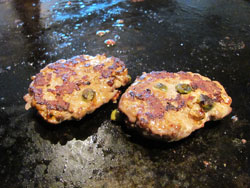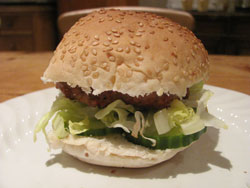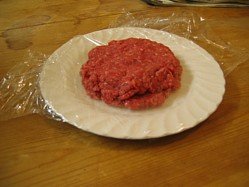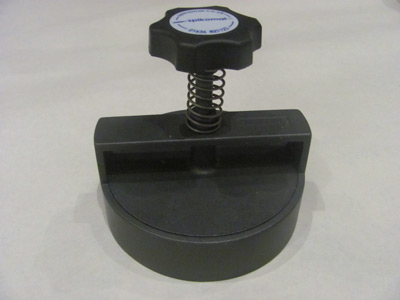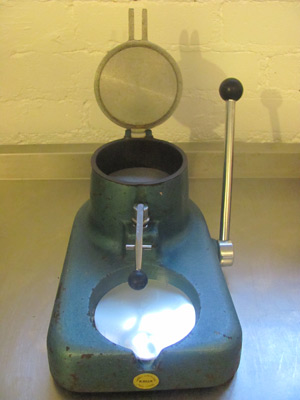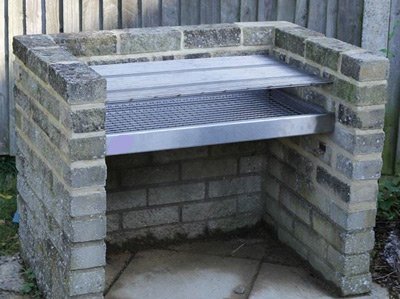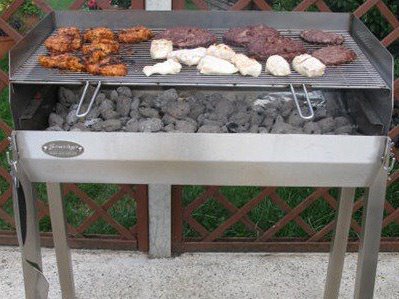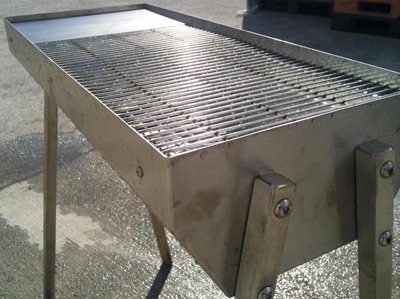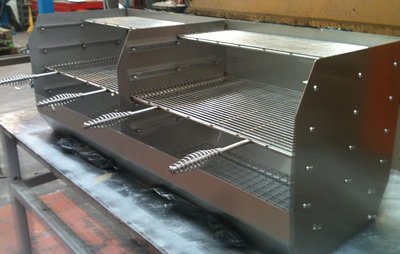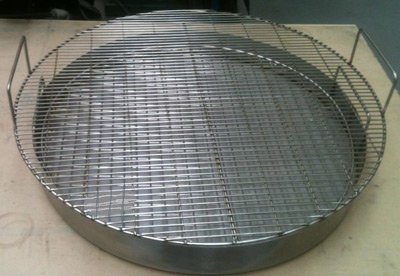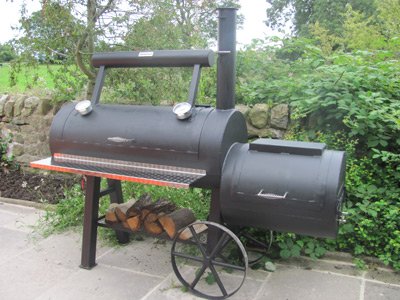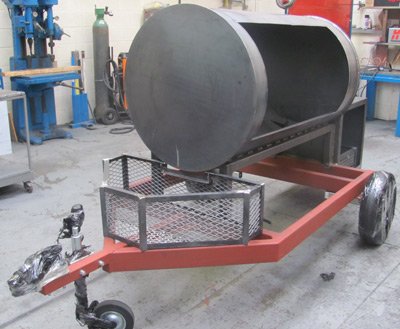- Recipes Home
- Hamburgers
Barbecue Grilled Hamburger Recipes
Here are ten barbecue grilled hamburger recipes using different meats with a variety of tasty ingredients and everybody loves a burger, right?
I used to think that anyone who produced sausages and burgers at a barbecue was completely lacking in imagination but I soon revised that opinion when I started to make my own burgers.
A burger is so easy to make, homemade is cheaper and if you follow my guide to making the perfect burger then they'll eat better too.
The basic burger is so simple and by home making you know exactly what you're eating. You won't find any additives in any of my grilled hamburger recipes!
13 Grilled Hamburger Recipes
The Basic Mix - Ground Beef and a little seasoning. The perfect place to start.
Gourmet Grilled Hamburger Recipe - Ground steak in this one
Plank Cooked Hamburgers - Check out this recipe even if you are not plank cooking them.
Grilled Venison Burgers - With redcurrant jelly
Pork And Apple BBQ Hamburger Recipe - A lovely fruity taste
Pork And Wild Garlic - Not to be missed
Greek Lamb Burger Recipe - With feta cheese
Burger And Fries - On The Big Green Egg
Vegetarian Barbecue Option - Potato And Feta Burgers
Grilled Turkey Burgers - 2 recipes here. One with traditional Madras curry spices and fresh coriander the other is Mexican inspired...slap on the Guacamole!
Bacon And Mushroom Barbecue Hamburger Recipe - Nicely spiced up with mushroom ketchup.
The Smash Burger - What is it? Could it be the best burger?
How To Make The Perfect Hamburger
1. Choice Of Meat
The cut of meat doesn’t really matter that much, what’s really important is the fat content. Think about when you select a steak, the marbling of the fat in the meat is really important because this is what melts during the cooking process and flavours the meat. This is what makes burgers the great opportunity to have great tasting meat…you can choose your fat content and because your meat is ground, you also get the perfect fat distribution throughout the meat.
So with this in mind there are three clear rules:
- Don’t buy extra lean ready minced / ground beef from the supermarket. It simply won’t have enough fat in it. Sadly, much of our cattle these days is reared to deliver lean beef, it might look good and it might make you feel good about buying it but flavour will be lacking.
- Do go to your local butcher and ask him to grind up some beef for you. To get the best flavour and moist texture from a cooked burger I recommend a ratio of lean meat 70:30 fat in my grilled hamburger recipes.
- Don’t buy expensive lean steak, you’re wasting your money. Go for the cheaper cuts, they’re just as lean and then add your own fat.
Better still, buy the meat and fat and grind it yourself. There are added advantages to doing this if you like to enjoy your burgers rare and also when it comes to forming patties.
Lean Burgers
The fat content for my grilled hamburger recipes may seem high to you at 30% but we live in a crazy world where we are paranoid about fat, this site is about good BBQ, not low fat diets, if you make a burger with say 10% fat content then it will be dry when cooked.
If you really want a lean burger then you need to use a technique that’s going to moisturize the meat and retain that moisture when cooked and I have 3 options for you:-
- Add some finely chopped onion to the mix and this will help keep it moist to a certain extent.
- Use a little breadcrumb and water (similar to sausage making) to the ground beef. 3% by weight.
- Add a small amount of potato flakes 3% and a similar weight of water is also a good alternative.
2. Forming Patties
By hand or using a burger press? Whichever way you choose, the secret is
not to press the patty too much. At home I make by hand, if I’m catering I use
a burger press. Hand mixing and shaping is also a great way to get all the family involved and you can have fun experimenting with your own grilled hamburger recipes.
Forming Patties By Hand
Let's face it, you're not going to get a perfect disc if you're forming your patties by hand but that said, there's absolutely no reason why you shouldn't make a burger this way.
First job is to wet your hands, this way the meat won't stick to your hands.
Make them as thin as you can because they always thicken up during the cooking process.This is because the muscle tissue in the pattie contracts when heated so everything scrunches up a little.
Once made, inter-layer the patties with cellophane wrap, this helps them keep their structure and makes it easier to lay them on the grill. A sprinkling of oil will stop them from sticking when they first hit the hot grill plate.
The Grain
This next technique takes all my grilled hamburger recipes to a new level, it's optional but really does make a difference to the texture of your burger.
If you are grinding your own meat, look how it comes out of the nozzle, it's like little cylinders. Layer all the cylinders on top of each other so that they all lie in the same direction and then roll the meat up in stretch wrap to form a nice thick sausage.
Chill the sausage to stiffen the meat and then slice through it to make your pattie. Remove any stretch wrap from the perimeter.
You now have a patty formed from lots of little cylinders standing on their end. When cooked, take a bite and you'll find that the burger is much less chewy, it just falls apart as you bite.
Binding
Don't be tempted to put a beaten egg in the mix. Some grilled hamburger recipes will state that this helps bind the meat but all it serves to do is make the burger more solid and the meat more chewy, it adds nothing to the flavor.
There is one exception to this rule though and that's when you are adding loads of other ingredients. Normally meat with a few ingredients will naturally bind but if you are adding a lot of extra ingredients to the mix then an egg may be a necessary evil.
Using A Burger Press
There are many types of burger press but you can break them down into two basic types:
- The manual press that relies on downward pressure to form the patty
- The semi-automatic press that pushes up against a fixed plate
The manual burger press (pictured here) makes a good shaped burger and for the price is a pretty good tool. Place your burger mix onto a separator disc, place another disc over the meat and then the burger press fits over the top. Weigh down on the central button and your burger is pressed, then lift the press, push the central button again and out drops a beautifully formed burger.
If I have a complaint about this type of press it's only that it's really easy to weigh down too much on the burger mix and so your burger is well compacted, maybe too well compacted and this can cause your cooked burger to be a little firm.
I must stress that I am being picky and these manual hamburger presses still represent good value for money. You'll find Amazon prices here.
The semi automatic burger press however can form a patty with the finest of touches and this makes the ideal texture for any of my grilled hamburger recipes.
Place a separator disc in the press, add your meat, another disc, close the lid and pull down gently on the handle. How hard you pull on the handle will determine how well compacted your patty is. Lift the lid, pull the lever down again and out pops your burger!
This picture above shows my own burger press. You can see that it's not the most modern, in fact I prefer the "feel" of a good old fashioned heavy press, but nowadays you can find more modern versions of this same design on Amazon.
The other big advantage of the semi automatic burger press is that you can punch out a larger number of burgers quite quickly and without major physical effort.
Whichever type of press you use, you’ll need to buy
some separator discs / papers firstly to keep the press clean and secondly to separate your
burgers prior to cooking. First point, if buying discs remember to buy the appropriate diameter
discs that match your press (usually 4” or 5”). Secondly, I recommend waxed
paper separators rather than cellophane because you can see the film and therefore
ensure that it has been removed before your burger hits the grill – melting cellophane
really doesn’t smell too good. Click here for prices on waxed paper discs.
3. The Truth About Rare Burgers
We cook meat to kill the bugs (there is also an added advantage that browned meat tastes good too). The main bug we are trying to protect ourselves from is e coli, a bacterium that grows on the surface of meat (there are lots of other bacteria too).
You can eat a rare steak safely because any surface born bacteria will be killed by cooking the outside of the meat but it’s not the same with a burger. Surface born bacteria get distributed throughout the ground beef and therefore could be inside your burger pattie.
For this reason I don’t recommend eating burgers rare, in fact why do you need to eat them rare at all?
- If you’ve got your fat
content right, your burger will be moist and full of flavour
- Browned meat actually tastes better
- You don’t need to worry about it going leathery like an overdone steak because your meat is ground and designed to be less chewy
If you must insist on eating your hamburger rare then there are two methods that you can use to safeguard your health. Note that you can only do this if you have your own grinding machine.
- Dip both your meat and fat into a pan of boiling water for 10 seconds prior to grinding it and then use your patties immediately.
- Use a blow torch to brown the surface of the meat that you are going to grind. Cut away the outer layer of browned meat and then grind the rest immediately.
Remember that this still isn’t an absolute guarantee because there’s always a chance of contamination as you mix in the seasoning or as you form your patties. You also need to take care to ensure that your grinder is 100% sterile before you start.
Timings in my grilled hamburger recipes ensure that your burger is cooked through but do also check using an instant read temperature probe. Don’t rely on breaking a patty open and looking at the colour, it’s not reliable and a temperature probe will tell you not only when it’s safe to eat but also with the right amount of testing you can also ensure that your burgers are perfectly cooked and not dry. Click here for my guide to safe internal meat temperatures.
Each patty should be between 120 - 150g depending on the diameter of the burger. (120g for a 4" burger and 150g for a 5" burger seems about right to me). Weighing out the meat is probably the most time consuming bit of burger making and you can cut out a lot of time and effort by using a standard sized spoon or an ice cream scoop. You'll soon work out how many scoops make a good burger patty.
4. How To Cook The Perfect Hamburger
If you're cooking a thin burger then grilling it is pretty much as good as it gets because the inside meat will get heated up reasonably quickly whilst the outside gets brown and crispy with going dry.
Thicker hamburgers warrant more care and attention and the best way I've found to deliver a supremely juicy burger with a crisp brown exterior is to use a two stage process:-
- Indirect Cooking - the all round radiant heat delivers an even cooking throughout the burger so the inside is both cooked and juicy.
- Direct Grilling - this stage browns and crisps the outside for the ultimate in texture and flavour.
It depends on the thickness of the burger but work on about 15 minutes of indirect cooking followed by direct grilling for 3 minutes on each side and check after step 1 with in instant read thermometer to ensure that you have reached a safe core temperature.
This 2 stage method is extolled in two of my grilled hamburger recipes that reflect different styles of BBQ cooking:-
5. Smash Burgers
It seems that 2018 is the year when everyone is talking about "smash burgers" so here's something to explain what they are and why everyone is raving about them.
What Is A Smash Burger
A smash burger is simply a patty that has weight pressed down onto it as it is placed on the grill so that the perimeter of the burger patty breaks apart and becomes a little "jagged" at the edges.
That's basically it, just a point of note however; don't try to make smash burgers on grill bars, you need to be cooking on a plancha.
Why Does A Smash Burger Taste Better?
The theory is that the jagged broken perimeter provides a larger surface area for browning and caramelization... and therefore flavour.
To be honest I'm not so sure. You can get a greater flavour impact my pouring sauce or beer over your burger and covering with a cloche. In other words it's not the "smash" that's adding the flavour it's the additional flavour adding options of cooking on a plancha.
6. What Else?
A good burger is not just about the meat, there's the bread and salad to consider.
Whether you choose white or brown bread is your choice. The flavours differ and brown bread is better for you so I'll leave that to your choice, all I will say is that you lightly toast the inside of the bun. This adds extra crunch and protects your bread from going soggy to some extent.
When it comes to salad, I again go for crunch. Iceberg lettuce, a few slices of cucumber and a slice of a large beef tomato.
7. The Summary - Apply These Rules To All Barbecue Grilled Hamburger Recipes
- Don’t buy ready ground meat, fresh is best.
- Your beef will be lean so add extra fat (we recommend 30% fat to 70% lean beef.
- If grinding yourself use a plate between 4mm & 6mm. If you grind too fine your hamburger won’t break apart so easily when you bite into it.
- You don’t have to add anything to the ground beef, you can just season the outside when cooking.
- You can make an excellent burger with ground beef, salt and pepper.
- Ensure your burger is cooked through (use a temperature probe to check). The best way to do this is to cook gently, don’t sear like a steak.
- Never press down on the pattie whilst it is cooking. It won’t cook any quicker and it will be drier because you’ve just squeezed out all the moisture.
- A two step process produces fantastic results especially with thick chunky burgers. Start with indirect heat for 15 minutes and then finish off with direct heat to caramelize.
- Do apply the usual rules about resting meat. Give your burger 5 minutes after cooking before you eat it. This will keep your burger moist and also help prevent your bread from going soggy
- Toast the inside of your bread for extra texture.
- Homemade sauce is best and use it sparingly. If you’ve gone to the trouble of making a great quality burger, don’t kill it in ketchup.
Easy Grilled Hamburger Recipes Start Here!
This is what I call the basic mix, it makes for an excellent hamburger and can be used as a foundation from which to build in more flavors.
There's enough here for 6 good sized burgers so if you need more, just double up on the quantities.
Serves:- 6 people
Preparation Time:- 15 minutes
Cooking Time:- 20 minutes
Total Time:- 35 minutes
Ingredients:-
- 1lb or 450g ground beef
- Half an onion
- ½ teaspoon ground coriander
- ½ teaspoon paprika
- a little pepper
- a little salt
Method:-
Chop up the onion, put it into a food processor and blitz to form a paste. Place your ground beef into a mixing bowl, add all the seasonings together with the onion paste and get your hands in to mix it all together.
OR For added “bite” add a couple of tablespoons of Worcestershire sauce and a few shakes of Tabasco.
OR If you’re a garlic and chili fiend like me, how about crushing a clove (or 2) of garlic into the mix? Or some finely chopped chili?
See Also:-
One of the novel barbecue grilled hamburger recipes sent in by one of our readers:
Turtle Burgers - and no, they're not real turtles!

Return to Recipes Home from Barbecue Grilled Hamburger Recipes
